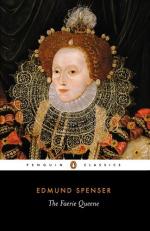229. SHALL WITH HIS OWNE BLOUD, etc., shall pay the price of the blood that he has spilt with his own.
263. Here Spenser imitates Homer’s Odyssey, xvi, 163.
267. THE GHASTLY OWLE. The poet follows the Latin rather than the Greek poets, who regard the owl as the bird of wisdom.
273. OF DEEP AVERNUS HOLE. Avernus in the poets is a cavern (in an ancient crater), supposed to be the entrance to the infernal regions. Cf. Vergil’s Aeneid, vi, 237. In Strabo’s Geography it is a lake in Campania.
298. CERBERUS, the dog which guarded the lower regions. This stanza is an imitation of Vergil’s Aeneid, vi, 417 seq. In Dante’s Inferno Vergil appeases him by casting handfuls of earth into his maw.
xxxv. In this stanza we see the influence of Homer and Vergil. Ixion, the king of Lapithae, was chained by order of Zeus to a fiery-winged wheel for aspiring to the love of the goddess Hera (Juno). Sisyphus had to roll a huge stone forever up a hill for betraying the designs of the gods. Tantalus, for divulging the secrets of Zeus, was condemned to stand tormented by thirst in a lake. Tityus, for an assault on Artemis, was pinioned to the ground with two vultures plucking at his vitals. Typhoeus, a hundred-headed giant, was slain by Zeus’ thunderbolt, and buried under Aetna. The gin on which he was tortured was probably the rack of the Middle Ages. Cf. the bed of Procrustes. Theseus, for attempting to carry off Persephone, was fixed to a rock in Tartarus. The “fifty sisters” are the fifty Danaides, who, for slaying their husbands, were condemned to pour water forever into a vessel full of holes.
322. SAD AESCULAPIUS, the god of medicine, slain by Zeus for arresting death and diseases.
354. AND FATES EXPIRED, and the threads of life which the fates (Parcae) had severed.
387. GREAT PAINES, AND GREATER PRAISE, etc. His praise, like his pain, is to be eternal.
xlvii. This list of the thralls of Pride is in imitation of a similar one in Chaucer’s Monk’s Tale, which was based on Boccaccio’s De Casibus Illustrium Virorum.
415. PROUD KING OF BABYLON, Nebuchadnezzar. See Daniel, iii and iv.
420. KING CROESUS, the last king of Lydia, who was overthrown by Cyrus in B.C. 646. Herodotus, i, 26.
422. PROUD ANTIOCHUS, Antiochus Epiphanes, king of Syria, who captured Jerusalem twice, and defiled God’s altar. He died raving mad B.C. 164. Josephus, Antiquities of the Jews, xiii, 5-9.
424. GREAT NIMROD, “the mighty hunter” (Genesis, x, 8), whose game, according to Spenser, was man. Josephus tells us that through pride he built the tower of Babel.
426. OLD NINUS, the legendary founder of Nineveh, and put to death by his wife, Semiramis.
428. THAT MIGHTY MONARCH, Alexander the Great (B.C. 366-323), king of Macedon. While consulting the oracle of Jupiter Ammon in the Libyan desert he was saluted by the priests as “Ammons Sonne.” He died either of poison (Plutarch) or of excessive drink (Diodorus).




